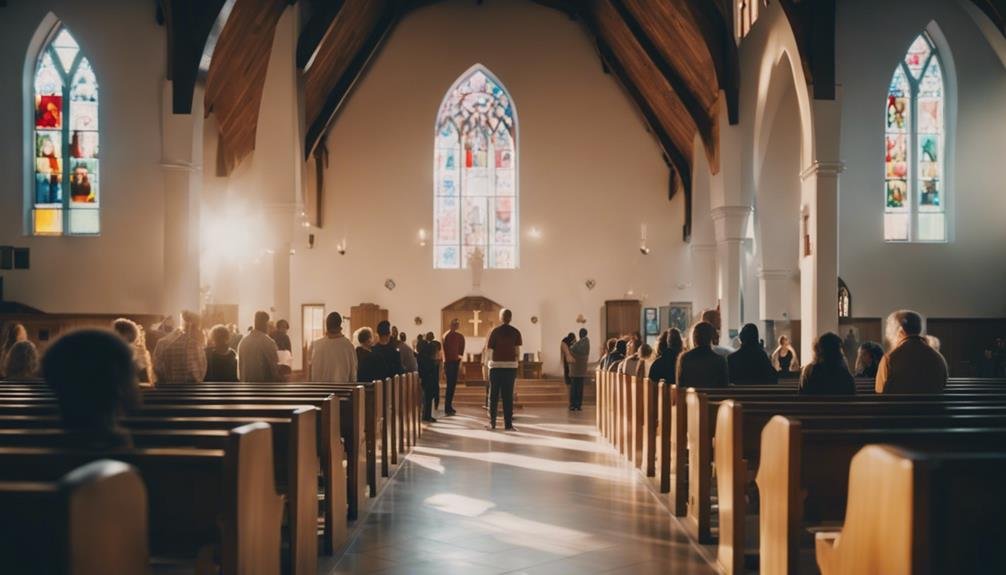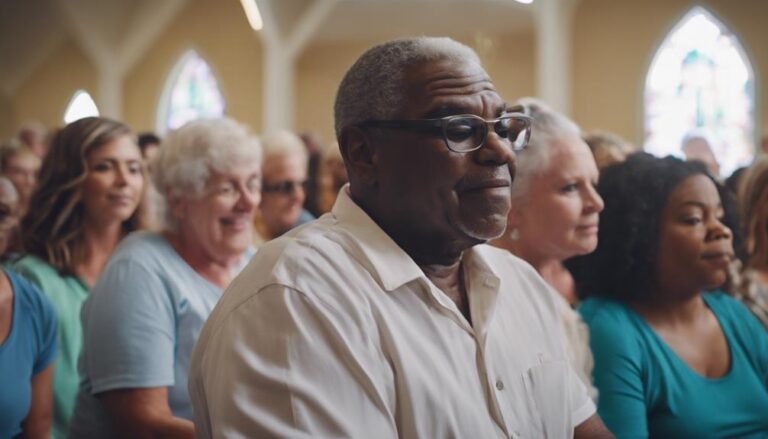Non-denominational churches have carved a distinctive niche within contemporary Christianity by emphasizing an individualized approach to worship and scriptural interpretation, often distancing themselves from traditional denominational constraints. Their rapid growth suggests a rising demand for spiritual environments that prioritize personal faith journeys over strict doctrinal adherence. This trend raises compelling questions about the evolving landscape of Christian worship and the broader implications for religious communities. How do these churches balance the principles of biblical authority with the need for adaptability, and what challenges do they face in maintaining unity amid diversity? The answers may reshape our understanding of modern Christian practice.
Key Takeaways
- Non-denominational churches prioritize personal connections with biblical teachings over rigid denominational doctrines.
- They offer flexible and eclectic worship styles, promoting a personalized spiritual experience.
- Emphasis is placed on biblical authority, leading to adaptive interpretations and practical worship practices.
- They foster unity by focusing on core Christian beliefs while being inclusive of diverse theological perspectives.
- Despite resource limitations, they maintain a community grounded in freedom and adaptability.
Understanding Non-Denominational Churches
Understanding Non-Denominational Churches necessitates an examination of their distinct departure from traditional denominational affiliations and their emphasis on a flexible approach to Christian worship practices. Non denominational church services often exhibit an eclectic blend of worship styles, diverging from the rigid structures characteristic of denominations such as Presbyterian or Methodist.
This flexibility enables congregants to experience a personalized and dynamic form of worship, unencumbered by the historical constraints of doctrinal orthodoxy. The adaptability in worship styles fosters an environment where individuals can explore their faith with greater autonomy, prioritizing personal connection with biblical teachings.
Non-denominational churches offer a sanctuary for those seeking spiritual freedom, underscoring the primacy of scripture over ecclesiastical traditions.
Growth and Characteristics

The rapid growth and distinctive characteristics of non-denominational churches underscore their increasing appeal among modern American Christians. Between 1990 and 2008, adherents surged from fewer than 200,000 to over 8 million.
This expansion can be attributed to their offering of customizable worship and modern interpretations of biblical teachings, which contrast sharply with the rigid doctrines of traditional denominations. Non-denominational churches eschew political bias and embrace adaptive worship styles, allowing congregants greater freedom in their faith practices.
These churches’ flexible theological frameworks and avoidance of denomination-specific edicts resonate profoundly with individuals seeking a more personal and less institutionalized spiritual experience, thereby fostering a vibrant and rapidly growing religious movement.
Unique Practices and Beliefs
Moreover, non-denominational churches distinguish themselves through unique practices and beliefs that often diverge substantially from those of traditional denominational congregations. Central to their identity is an emphasis on biblical authority, eschewing doctrinal rigidity in favor of a more flexible interpretation of scripture. This approach facilitates practical worship, allowing congregations to adapt their services to meet contemporary needs without the constraints of established liturgies.
Practices such as acapella congregational singing and adult baptism highlight their commitment to scriptural precedents. Moreover, the absence of political bias in their social engagements underscores a focus on spiritual rather than institutional priorities. Such distinctiveness fosters a community grounded in freedom and adaptability, resonating with individuals seeking a more personalized faith experience.
Challenges and Considerations

Exploring the landscape of non-denominational churches reveals a series of challenges and considerations that merit rigorous examination. One significant challenge is resource limitations; these congregations often lack the financial and organizational infrastructure of larger denominations, which can impede their ability to provide extensive programs and services.
Additionally, the absence of a unified doctrinal framework can lead to potential misunderstandings among congregants and between churches. Such misunderstandings may result in doctrinal inconsistencies and fragmented teaching, complicating efforts to maintain theological coherence.
Furthermore, the freedom to interpret scripture independently, while appealing, can sometimes lead to divergent practices and beliefs, posing a challenge to the very unity that non-denominational churches aim to foster. Analyzing these dynamics is essential for a thorough understanding of their unique position within Christianity.
Diversity and Unity in Christianity

Diversity within Christianity, evidenced by the multitude of denominations, reflects both the richness and the challenges inherent in maintaining doctrinal unity. This doctrinal diversity arises from varied theological interpretations, cultural contexts, and historical developments. However, it poses a significant challenge to achieving unity through faith.
Non-denominational churches, by eschewing strict denominational affiliations, seek to bridge these doctrinal divides, emphasizing a shared commitment to core Christian beliefs. While this approach can foster inclusivity and adaptability, it also necessitates a balance between accommodating diverse perspectives and upholding essential doctrines.
Ultimately, the quest for unity within Christianity hinges on a collective commitment to foundational truths, transcending individual doctrinal differences.
Frequently Asked Questions
How Do Non-Denominational Churches Handle Marriage Ceremonies?
Non-denominational churches handle marriage ceremonies with a focus on flexibility and personalization, often tailoring ceremony customs to the couple’s preferences.
Pre-marital counseling is typically emphasized to prepare couples for a lifelong commitment, grounded in biblical principles.
These churches prioritize the couple’s unique journey and values, allowing for a customized approach that aligns with their spiritual beliefs while avoiding rigid denominational constraints.
Are Non-Denominational Churches Involved in Community Outreach Programs?
Non-denominational churches often engage in community outreach programs. For instance, Hope Haven, a non-denominational initiative, supports people with disabilities in Iowa. They collaborate with local charities and offer numerous volunteer opportunities for congregants, fostering a spirit of community service.
This approach underscores their adaptability and commitment to social justice, highlighting their unique contribution to the broader community while promoting individual freedom and involvement in charitable activities.
What Role Do Women Play in Non-Denominational Church Leadership?
In non-denominational churches, the role of women in leadership varies greatly. Some congregations embrace female pastors, allowing women to lead services and offer spiritual guidance.
Women’s ministry is often integral, providing platforms for women to engage in teaching, mentoring, and community outreach. This flexibility allows non-denominational churches to adapt to contemporary views on gender equality while fostering an inclusive environment for spiritual growth and leadership.
Do Non-Denominational Churches Offer Youth Programs?
Do non-denominational churches offer youth programs?
Absolutely, they often provide various initiatives such as youth retreats and mentorship programs. These churches aim to foster spiritual growth and moral development among younger congregants. By emphasizing personal relationships and biblical teachings, these programs cater to the evolving needs of youth, offering them a supportive community and opportunities for leadership and personal development.
How can these initiatives impact the future of non-denominational congregations?
How Do Non-Denominational Churches Approach Mental Health Issues?
Non-denominational churches often address mental health issues through pastoral counseling, emphasizing mental wellness as an integral part of spiritual health. By employing a holistic approach, these churches provide individualized support to congregants, integrating biblical teachings with contemporary psychological practices.
This adaptability allows for a more personalized and less doctrinally constrained approach to mental health, appealing to those seeking freedom from traditional denominational frameworks while maintaining spiritual guidance.
Conclusion
Non-denominational churches present a distinctive Christian perspective by emphasizing flexibility in worship and biblical interpretation while fostering community unity.
Notably, a Pew Research Center study revealed that approximately 20% of U.S. adults identify as members of non-denominational congregations, underscoring their growing influence.
These churches’ commitment to adaptable spiritual practices and diverse worship styles provides a compelling alternative to traditional denominational structures, thereby contributing to the broader tapestry of contemporary Christian faith.
SEE ALSO
Unveiling the Appeal of Non-Denominational Christianity
Unveiling the Appeal of Non-Denominational Churches






